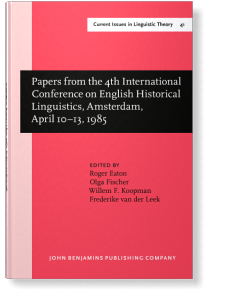Papers from the 4th International Conference on English Historical Linguistics, Amsterdam, April 10–13, 1985
These papers are a selection from papers presented at the 4th International Conference on English Historical Linguistics (Amsterdam, 1985). Most studies deal with some aspect of an earlier stage of English, though present day varieties of English are also under investigation. Many of the papers show that there is a growing interest in the question why a certain change has taken place. Furthermore, the volume contains a considerable number of papers on historical syntax.
[Current Issues in Linguistic Theory, 41] 1985. xvii, 341 pp.
Publishing status:
© John Benjamins Publishing Company
Table of Contents
-
Preface | p. vii
-
List of participants | p. xi
-
Proceedings of the 4th ICEHL | p. 1
-
‘I deny that I’m incapable of working all night’: Divergence of negative structures in British and Indian EnglishJean Aitchison and Rama Kant Agnihotri | p. 3
-
Relative Which in late 18th-century usage: the Clift family correspondenceFrances O. Austin | p. 15
-
Lengthening of a in Tyneside EnglishJoan C. Beal | p. 31
-
The origins of periphrastic Do: Ellegård and Visser reconsideredDavid Denison | p. 45
-
Synchronic variation and linguistic change: Evidence from british english dialectsOssi Ihalainen | p. 61
-
Old English infinitival complements and West-Germanic V-raisingAns M.C. van Kemenade | p. 73
-
The simplification of the Old English strong nominal paradigmsSamuel Jay Keyser and Wayne O'Neil | p. 85
-
Verb and particle combinations in old and middle EnglishWillem F. Koopman | p. 109
-
The impersonal verb in context: old EnglishLinnea M. Lagerquist | p. 123
-
The south African Chain-shift: order out of chaos?Roger Lass and Susan Wright | p. 137
-
Of Rhyme and reason: some foot-governed quantity changes in EnglishDonka Minkova | p. 163
-
Lexical variation of early modern English exclusive adverbs: Style switching or a change in progress?Terttu Nevalainen | p. 179
-
Some remarks on complementation in old EnglishRuta Nagucka | p. 195
-
The interpretation and development of form alternations conditioned across word boundaries: The case of Wife’s, Wives and Wives’Frans Plank | p. 205
-
A note on the voicing of initial fricatives in middle EnglishPatricia Poussa | p. 235
-
Expression of exclusiveness in old English and the development of the adverb onlyMatti Rissanen | p. 253
-
The great Scandinavian beltM.L. Samuels | p. 269
-
Discourse markers in early modern EnglishDieter Stein | p. 283
-
Assessment of alternative explanations of the middle English phenomenon of high vowel lowering when lengthened in the open syllableRobert P. Stockwell | p. 303
-
Preliminaries to the linguistic analysis of old Engllish glosses and glossariesThomas E. Toon | p. 319
-
The role of INFL in word order changeLisa deMena Travis | p. 331
Cited by (3)
Cited by three other publications
Los, Bettelou & Patrick Honeybone
2022. Introduction. In English Historical Linguistics [Current Issues in Linguistic Theory, 358], ► pp. 2 ff. 
This list is based on CrossRef data as of 18 july 2024. Please note that it may not be complete. Sources presented here have been supplied by the respective publishers. Any errors therein should be reported to them.
Subjects
Main BIC Subject
CF: Linguistics
Main BISAC Subject
LAN009000: LANGUAGE ARTS & DISCIPLINES / Linguistics / General
